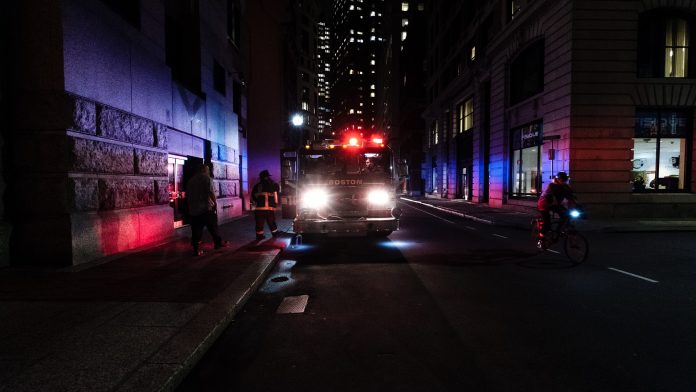I always found it really stressful to be on call for emergencies, until I learned a different way to deal with the tension of being on call.
Working ridiculous hours
We worked punishing hours when we were hospital interns and residents. Our 5 normal working weekdays were rostered as 10 hours shifts, but we often worked 15 hours each day. As well as this, we would be on call one weeknight per week plus one weekend in four, which consisted of staying in the hospital and being available, and usually awake and working, from 8 am Saturdays to 8 am Mondays and then doing our normal 5 day working week, including Mondays. This was neither safe – for us or our patients – nor conducive to any kind of normal life.
The tension of being on call
More stressful than the ridiculous hours, though, was the actual tension of being on call for life-and-death emergencies.
Our residents’ quarters were in a separate wing from the main hospital, so when our pagers went off for a cardiac arrest, we had to literally jump up and run for our lives (and theirs) to have any hope of getting to the ward in time to resuscitate the patient. We slept in theatre scrubs so we did not have to waste time getting dressed.
I found this scenario enormously stressful, as I did not want anyone to die on my watch, so even on the rare occasions when it was quiet and I could have slept, I was rarely able to, because of the constant underlying tension and anxiety I felt.
I carried this tension beyond my internship. Whenever I was on call I would have trouble sleeping, and would be generally more tense and irritable, especially with my family. I found it particularly difficult when my children were very young, as for a time I was raising them on my own, so I also had to worry about how I was going to care for them if I was called in, and always had to have backup arrangements in place for their care during that time.
Even though I am no longer on call for life-and-death emergencies, I am still on call for surgical emergencies, and at any moment may have to drop everything and drive into the hospital to see a patient or operate on someone’s eyes.
As a consultant surgeon, I am on call one week in four, which means once a month for 168 hours in a row. I used to jump whenever the phone rang, and my body would go into an instant fight-or-flight response. On top of the tension of the week itself, I would feel the tension building up the week before, and would take a while to wind down again the week after, so I spent much longer being physically on call than my roster showed!
A new and more supportive way of being on call
I have now found a different way to deal with the tension of being on call.
A friend of mine suggested something simple and practical that has changed my life:
“You are not on call until you get called.”
This was a revelation to me. I used to spend the whole time I was rostered to be on call, actually on call – in physical, mental and emotional fight-or-flight mode – which was exhausting for me and for those around me.
Now, I just go about my days in the same way, whether I am on call or not, the only difference being that when I am on call, I don’t plan events or appointments that take me out of the area or render me unavailable for any length of time, and I take care to make sure that my phone is charged and that I can hear it easily if it rings.
I prepare myself now for the weeks I am on-call, so I don’t feel stressed in the same way as I used to. I make sure that my physical needs are taken care of – simple things like being up-to-date with the washing, having plenty of food in the fridge, and preparing meals in advance, so that if I do get called out, there is food when I come home. I rest beforehand and keep other activities to a minimum that week. I usually book patients in my consulting rooms in a lighter way that leaves some space for emergencies that week, so that we can fit extra people in if need be, rather than having to cram them in between booked patients or stay back late.
Dealing with anxiety
All in all, those weeks on call can sometimes be more restful than usual, for if the on call is quiet, there is extra time and space in my days to enjoy. All because I no longer live in a state of constant emergency, for I know that I am not on call until I get called.
This transformation started out as just a physical thing, but I find I am going deeper and deeper with it. Now that I am not so worried about the physicality of on call – for my children have grown up, I no longer drink alcohol (so I don’t have to worry about how I am going to do without that for a week on top of everything else) and my husband is very caring and supportive – I am realising that there is a deeper anxiety to deal with.
I have found that the main stress of being on call was the fact that I felt anxious, that I would not be equipped to deal with whatever came my way. I feel pretty confident in my everyday working life now, and only choose to do procedures that I feel I do well, leaving the others for my colleagues to do, but when you are on call, you may have to deal with all sorts of things you don’t normally encounter, that take you out of your comfort zone.
As well as ensuring that I am clinically as competent as I can be to deal with any emergency that presents, the way I have learned to deal with this underlying anxiety is to develop more trust in myself as a person, and in my ability to handle whatever may come my way. This has come about through the simplicity of being present with whatever I am doing – bringing my mind to focus on whatever my body is doing – and this simple technique keeps me in my body and out of my head, bringing a calmness and a sense of presence to my every activity.
So, whatever the activity I am engaged in, I have a sense of ease in my body and confidence in my being that I bring to whatever I do, including being on call.
Developing a deeper understanding of what it means to be on call
I have also come to understand that in some ways, I am always on call, so I have learned to live in a way that I can sustain this, each and every day.
I live and work in a small community. Many patients are also my friends, I meet people when I am out and about who often ask for my professional opinion, my mobile number has been circulated, I can be found on Facebook, and the hospital calls me if any of my patients come in out of hours. There is never a time when I am truly ‘off’. I don’t always say yes to requests for out-of-hours help, but I do deal with them graciously and offer people support and suggest where to get help if I cannot help them there and then.
And I have learned that what I do in my time ‘off’ is just as important as what I do in my time ‘on’, and that they each affect the other, for in truth, it is all one life, and we cannot compartmentalise it.
Say I were to spend a day ‘off’ living in a way that was not truly supportive of me, eating and drinking to excess, going out partying, staying up late, I would take that behaviour and that feeling into work the next day, and it would affect me, and therefore everyone I interact with. We know whether we are ‘off’ or ‘on’ and other people feel that too.
If I spend that same day ‘off’ caring for myself, nourishing my body and being, and staying open to people and life and whatever comes my way, I bring that care and openness to that day, the next day and to every day.
If I live a day in tension, I need to seek relief from that, and this leads to a way of living that is full of peaks and troughs, and can be exhausting and depressing.
If I live a day at ease with myself and others, then my day flows more harmoniously, I feel more steady, and at the end of it I feel complete, and do not need to seek reward for all the work I have done or relief from the tension I have been feeling.
The more we can work on dealing with the tension we feel in everyday life, the less we will need to seek relief and reward, and the more at ease we will feel in our bodies.
This is an ongoing process for me that I have by no means yet mastered, but it is something that I continue to work on, and I feel more and more at ease in my body and my mind because of it. I am open to being called, every day, but I don’t live with the tension of being on call, because I know that I have whatever is needed within me to deal with whatever comes my way, whenever I am called.









